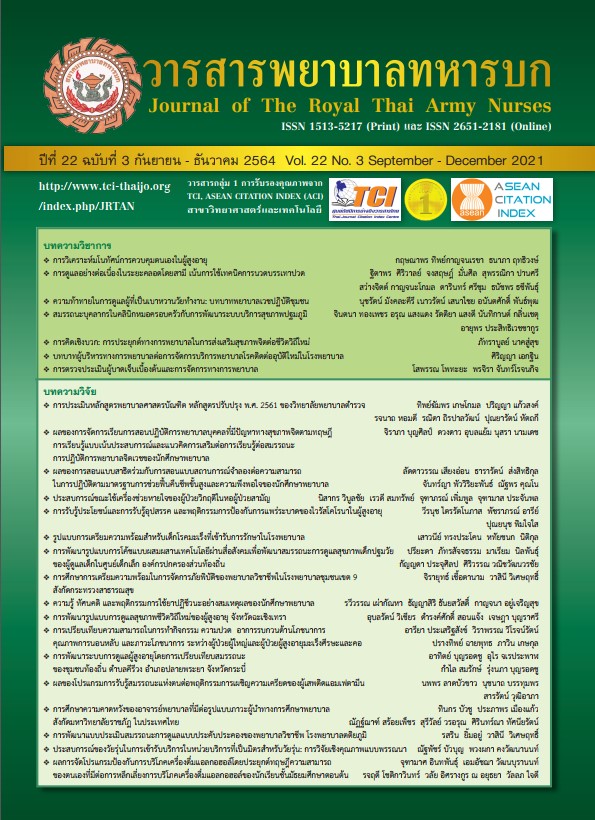Effects of Preventing Alcohol Consumption Program by Applying Self-Efficacy Theory on Avoiding Alcohol Consupmtion of Lower Secondury School Students
Keywords:
Alcohol drinking prevention program, Self-efficacy, Alcohol drinking prevention behavior, Secondary School StudentsAbstract
This quasi-experimental research aimed to study the alcohol drinking prevention program applying self-efficacy theory among secondary school students. The 66 samples were divided by the purposive sampling method into two groups: 33 experimental group and 33 comparison group. The experimental instrument were 1.) The alcohol drinking prevention program applying self-efficacy theory learning management plans. 2.) The self-efficacy questionnaire 3.) The alcohol drinking prevention questionnaire 4.) The alcohol knowledge test. The data obtained were analyzed by using percentage, frequency, standard deviation, t-test, One-way ANOVA, LSD and it conducted the level of statistical significance at .05 level.
The findings were as follows: 1.) After treatment, the mean scores of the self-efficacy, the mean scores of alcohol drinking prevention behavior and the mean scores of alcohol knowledge test from the alcohol drinking prevention program of the experimental group were found higher than the comparison group in statistically significant at .05 level. 2.) After treatment, the mean scores of the self-efficacy, the mean score of alcohol drinking prevention behavior and the mean scores of alcohol knowledge test from the alcohol drinking prevention program of the experimental group were found higher than before treatment in statistically significant at .05 level. While the follow-up phase and after treatment were found no different.
Downloads
References
Center of Alcohol Studiescas. The situation of alcohol consumption and its effects In Thailand, year 2013. Nonthaburi: Thegraphicsystem; 2013. (in Thai)
Aorrathai W. Alcohol and crime, violence, order and social safety; 2016. (in Thai)
Center of alcohol studiescas. Facts and figures of alcoholic beverages in Thailand. Songkhla: Center of alcohol studiescas; 2016. (in Thai)
WHO. Global status report on alcohol and health-2014: Geneva : World Health Organization; 2014.
Bandura, A. Self-efficacy: toward a unifying theory of behavioural change. Psychological; 1997.
Choojan S. & Wanakul T. Devolopment of health education on child centered program in self-efficacy and food consumption behavior among school aged childre in Lamlukka District, Pathumtani Province. Journal of the royal Thai Army Nurse 2018; 19 (3): 158-164. (in Thai)
Ministry of Education. Basic Education Core Curr iculum B.E. 2008. Bangkok, The Agricultural Cooperative Federation of Thailand. Limited.; 2008. (in Thai)
Pratumporn C. Effects of an alcohol use prevention program applying self- efficacy. Grade students in Nakhon Pathom Province. Ramathibodi Nurseg gospel. year 24; 2018. (in Thai)
Pannawit P,Rungrawee S, Aimutcha W. Health education program development using belief patterns in health to prevent alcohol drinking of female secondary school students. Journal of medicine and health Science 2017; 24(1): 55-66. (in Thai)
Darunwan S. Preventive behavior of alcohol drinking among students. university: A case study of a private university. HCU Journal 2017; 20(1): 127-128. (in Thai)
Downloads
Published
How to Cite
Issue
Section
License
บทความหรือข้อคิดเห็นใดใดที่ปรากฏในวารสารพยาบาลทหารบกเป็นวรรณกรรมของผู้เขียน ซึ่งบรรณาธิการหรือสมาคมพยาบาลทหารบก ไม่จำเป็นต้องเห็นด้วย
บทความที่ได้รับการตีพิมพ์เป็นลิขสิทธิ์ของวารสารพยาบาลทหารบก
The ideas and opinions expressed in the Journal of The Royal Thai Army Nurses are those of the authors and not necessarily those
of the editor or Royal Thai Army Nurses Association.






